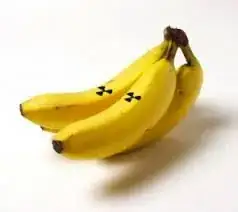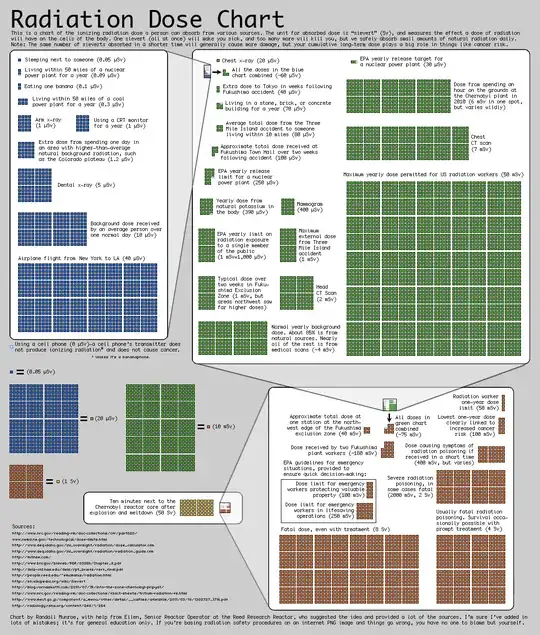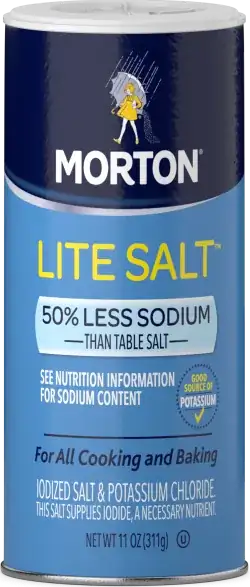Is it true that bananas are radioactive, and if you eat too many it can kill you? If yes then how many bananas are good to eat at once.
-
2I've read that bananas also do contain some alcohol, which seems to be more relevant. Don't know whether this is a hoax, though. [This PDF](http://web.archive.org/web/20070221094738/http://www.drugs.indiana.edu/publs/factline/pdfs/na_beer-2004-screen.pdf) says "_…according to a report published by Indiana University, a standard glass of orange juice contains between .2% and .5% alcohol…_". Here is [another study about alcohol in certain food](https://www.ncbi.nlm.nih.gov/pmc/articles/PMC5421578/). It says that bananas contains 0.4 g ethanol per 100 g fruit. – Uwe Keim Oct 27 '18 at 21:54
-
3It's more like bananas is potassium rich and potassium is radioactive (so is almost everything else). – user3528438 Oct 28 '18 at 19:42
-
12EVERYTHING living or once-living is radioactive, because of carbon-14 uptake from the food chain. – John R. Strohm Oct 29 '18 at 17:13
-
Harriet Hall , M.D. (ret.) has published a list of all the molecular compounds in a banana. (See skepdoc. info). Her point is that almost any food could carry a warning such as "May contain scary-sounding stuff that you don't understand". – DanielWainfleet Oct 31 '18 at 16:12
-
You should watch Veritasium's videos about radiation.Start with https://youtu.be/wQmnztyXwVA, and explore other videos in his channel on this topic. Besides being an educator primarily focussing on common people's misconceptions, he has a degree in physics. People are often often scared by the very word "radiation," but we are literally bathing in it, and eating and inhaling radioactive substances. The key is the quantity. (I am not affiliated with Veritasium, but am a big fan of his science ed work. And I have a degree in physics, too). – Nov 01 '18 at 04:29
8 Answers
Yes, it's true that bananas are radioactive, however, the amount of radiation that you get from eating a banana is negligible. It's also true that eating too many bananas can kill you, but if you manage to eat enough bananas to get radiation poisoning, you're going to die from something else long before potassium exposure comes into the equation - like, say, the death penalty after murdering the next person to bring a banana within 50 miles of you.
Source https://xkcd.com/radiation/
Bananas are on the left, third from the top. To better communicate the scale, the top legal (i.e. totally negligible) radiation dose for US workers is equivalent to eating 500,000 bananas/year.
There is actually a unit of radiation exposure measurement called the Banana equivalent dose. Suffice to say, there are about a thousand other sources of radiation in your day to day life that you should worry about before how many bananas you eat starts to become a real concern. You can safely eat as many bananas as you please, at least, from a radioactivity standpoint.
-
37In answer to the specific question asked, according to the chart it's one million bananas for a measurable increase in cancer risk, or twenty million bananas for potentially-fatal radiation poisoning. Further, since potassium-40 decays by a mixture of beta emission and electron capture, consuming the bananas is not required: [it's sufficient to have them piled on top of you](https://xkcd.com/1260/). – Mark Oct 26 '18 at 22:34
-
48@Mark somehow, I think someone with 20 million bananas piled on them would not be worried about radiation poisoning. – FuzzyChef Oct 27 '18 at 01:40
-
1@FuzzyChef I doubt I've have much else to occupy my time, so why not? – David Richerby Oct 27 '18 at 15:23
-
11
-
6@Mark Beta particles aren't going to do much to you from outside. You need to eat the bananas and absorb the potassium. – Loren Pechtel Oct 28 '18 at 01:34
-
1@DavidRicherby - Because they'd be dead from the gross crush trauma of having [9.15 million kg of bananas on top of them](http://www.scp-wiki.net/scp-3521). – Malady Oct 28 '18 at 14:52
-
1@Malandy 20 million bananas is more like 2.5 million kg. That's nothing. Here, hold my beer. – David Richerby Oct 28 '18 at 17:04
-
2@Mark: Would the non-potassium bits of the inner layer of bananas not become a blocker for the radiation you should get from the outer layer of bananas? – Flater Oct 29 '18 at 08:49
-
2@Flater: Of course. The effect is already noticeable with a single banana; radiation from the far side is quite effectively shielded. – MSalters Oct 29 '18 at 08:56
-
2@Mark "Further, since potassium-40 decays by a mixture of beta emission and electron capture, consuming the bananas is not required" The penetration of beta radiation is not sufficient to be able to pass though other bananas. (required if you're going to stack 20million on someone) After all, if they can penetrate through the other bananas, then they're not going to be absorbed by you. – UKMonkey Oct 29 '18 at 13:24
-
1
-
I'm already afraid of having a nightmare about 20 million radioactive bananas chasing me. – ElmoVanKielmo Oct 31 '18 at 10:57
-
4@MikeTheLiar Actually the dose indicated on the graph is correct for the banana irself, but wrong if referred to the person eating it. It's a common mistake. That dose is calculated on the full amount of Potassium in the banana, however when you eat it the body will discard the excess from your body (that means... all the amount in the banana), therefore the dose you actually receive is (in first approximation) only the integral of the decreasing exponential starting at the full content of the banana when you eat it, down to zero in less than a day... much much smaller than you expected. – FarO Oct 31 '18 at 11:58
-
It may be a small amount, but cargo ships filled with bananas _do_ set off the radioactivity sensors installed at ports to detect possible radioactive materials being smuggled into the country – Baldrickk Oct 31 '18 at 13:13
-
3@FarO bottom of the chart, from the artist: "I'm sure I've added in lots of mistakes; it's for general education only. If you're basing radiation safety procedures on an internet PNG image and things go wrong, you have no one to blame but yourself." – Mike G Oct 31 '18 at 13:17
-
1@Mark, UNKmonkey is correct. The *absorbed* dose of radiation is what really matters, and different types of ionizing radiation have different properties. ɑ-particles are heavy, and the top layer of dead skin cells fully blocks them. β-radiation is more penetrative, but skin protects from it significantly. Photons in X- and ɣ-rays can pass through your whole body, or absorb and cause damage at any depth. Swallowing an ɑ or β source is a whole different thing. K ions are in all tissues, and all are β-active. So an unpeeled bananas outside body gives you <1% of the dose of a consumed one. – Nov 01 '18 at 04:11
-
Actually, it probably *will* be the potassium that kills you, but not the radioactive potassium. – Scott Seidman Nov 01 '18 at 14:08
In addition to the answers explaining that bananas do contain radioactive potassium, but in small amounts, it's also worth noting that your body maintains a fixed amount of potassium through metabolism.
So even if you somehow manage to consume 5 million bananas, your body won't actually be exposed to 5 million Banana equivalent doses of radiation.
- 2,543
- 6
- 23
- 24
- 551
- 3
- 3
-
7This is really the only correct answer. The whole concept of the banana equivalent dose was a nice attempt to educate people about quantitative measures of radiation, but it was fatally flawed for this reason. A better example would be Brazil nuts, which contain trace amounts of radium. Unfortunately, "Brazil nut equivalent dose" just isn't very catchy. – Oct 27 '18 at 16:56
-
I wonder what it takes to overload that system (e.g. dehydration) and whether a buildup of potassium in your system would cause problems at lower doses than the radiation – Chris H Oct 29 '18 at 07:30
-
5@ChrisH: Your body uses certain chemicals like potassium, sodium, calcium, and chloride to make your nerves and muscles work. If they get out of balance, your muscles and nerves would stop working correctly. Elevated potassium levels is called hyperkalemia: https://en.wikipedia.org/wiki/Hyperkalemia – Dietrich Epp Oct 29 '18 at 21:00
-
@DietrichEpp, yes, I've been reading a bit about electrolyte requirements and balance recently (in the context of endurance exercise). I hadn't really thought about getting too much, rather the opposite, when sweating several litres in a day. I see that even extreme hyerkalemia is only something like a doubling of normal levels, which would be problematic way before radiation could do anything, however the hyerkalemia arose. – Chris H Oct 29 '18 at 21:18
-
@Ben, like with all such measures, the assumption is that you eat all these bananas at once, in a single sitting. This still doesn't make it correct, because the Potassium-40 half-life is enormous and you won't keep yourself exposed for long, but it shows that you'll die from other things :) – Zeus Oct 30 '18 at 00:33
-
@Zeus: I disagree. The most common assumptions when discussing radiation doses are that (1) the effect is linear and has no threshold (LNT), and (2) the effect is proportional to the dose and independent of the dose rate. Neither of these is probably really true, but they are baked in to the way we normally discuss this stuff, e.g., the definitions of units like rem and Sievert. At low doses, the independence of dose rate sort of makes logical sense because we're talking about the low probability of causing cancer in one cell, which then takes years or decades to develop. [...] – Oct 31 '18 at 02:34
-
[...] It is probably true that these two assumptions are inappropriate and not commonly used in other situations. E.g., they would be silly if we were talking about cyanide or heroin. But that isn't what we're talking about, we're talking about radiation. Note that in the case of Brazil nuts, unlike bananas, the dose (in Sieverts) is independent of the rate at which you consume the food (one meal versus years), and it's pretty plausible that the risk is independent of dose rate as well. – Oct 31 '18 at 02:35
-
@Ben, I agree with all you said, but when, in general, people _don't_ know about 'dose rates', as in "the lethal dose of X is Y", or "if you eat too many [bananas] it can kill you", the assumption is of a single dose. Or so I believe... – Zeus Oct 31 '18 at 05:47
-
Metabolism can take care of potassium for fairly normal diets. Those mechanisms can get overwhelmed for super doses. – Scott Seidman Nov 01 '18 at 14:10
While it's true that bananas are unusually radioactive (which actually means very slightly), you should keep in mind that all plants and animals are radioactive. For people, about half of our intrinsic radioactivity comes from the potassium in our bodies, and about half from the carbon-14 which we all carry around.
As for safe quantities, that's pretty simple: about 4 liters (9 pounds or so). But this has nothing to do with radioactivity - it's the approximate maximum capacity of the normal human stomach. Eating more than this runs the risk of tearing the stomach and dying.
The question of banana radioactivity has sparked the creation of the Banana Equivalent Dose of radiation. It's about 0.1 μSievert. Since it takes about 5 to 7 Sieverts to kill an adult human, the lethal dose (radiation) for bananas is something like 50 million bananas. And it's even harder to kill somebody that way than that rather silly number suggests. The body has a fairly comprehensive and efficient set of mechanisms for keeping things in balance, and excess potassium is typically excreted within 24 hours. Although, admittedly, the changes needed to support the ingestion of 50 million bananas would almost certainly cause other changes in the (formerly) human body, and any discussion of associated effects become pure speculation.
- 103
- 2
- 321
- 1
- 2
-
2James' answer seems to me to provide the best perspective. Sure, the banana's radioactive, but so are you. Also, every living thing on Earth. – Don Branson Oct 29 '18 at 16:12
Yes, bananas are radioactive. They contain potassium, and a small part of this comes as a radioactive isotope 40K. The dose of an average banana is (rounded up) around 0.1 μSv. Other potassium-rich foods also naturally contain 40K, e.g. potatoes.
There is absolutely nothing to worry about. Our natural environment and cosmic radiation means our bodies are constantly exposed to radioactive material, but just in trace amounts.
- 57,632
- 7
- 163
- 213
-
Yes. [The wings are not on fire](https://youtu.be/PktyJR_U2J0?t=28s). – leftaroundabout Oct 27 '18 at 00:47
If you were to somehow actually take all that radioactivity into your body you would be dead long before the radioactivity became an issue. The radioactive element is potassium--and potassium chloride is used as an execution drug.
In practice your body maintains potassium levels at the right amount (too little is also deadly), eating more bananas simply means more potassium in your urine.
Besides, I have a jar sitting here next to me. It's far more radioactive than a banana. It's meant as food, though:
- 299
- 1
- 2
- 7
-
1Wait, you have a jar containing an execution drug sitting besides you?!?! – Konrad Rudolph Oct 29 '18 at 17:36
-
2@KonradRudolph, [sola dosis facit venenum](https://en.wikipedia.org/wiki/The_dose_makes_the_poison). – Mark Oct 29 '18 at 20:55
-
2@Mark In this case it isn't even the dose as the speed. In the old days doctors very occasionally killed accidentally patients this way. The potassium was intentional, of medical benefit if injected into the IV bag, but lethal if injected into the IV line. Now they only have it available pre-mixed in the IV bags to avoid such mistakes. (Taking it slowly and carefully to avoid an oops isn't an option--the problems occurred when patients were crashing.) – Loren Pechtel Oct 30 '18 at 00:32
When people compare the radiation received from other sources with the radiation from eating a banana, the point of the exercise is not to say that eating bananas is risky. It’s to say that the radiation level you’re exposed to from from things like nuclear power is safe, and you shouldn’t worry about it (or about eating bananas).
- 425
- 3
- 8
Yes, but it's extremely small.
Bananas do have a very small amount of radioactivity, but as showed by the chart linked in another answer, it's a really small amount, compared to the amount you are exposed to by being around everyday items/doing everyday activities.
You would need to eat several million bananas in a short time span to actually suffer ill effects/die, which we all know is basically impossible. The bananas would've probably killed you some other way.
Basically, don't worry.
Well, yes to both, up to a point. All things are radioactive - radioactive isotopes occur in minute concentrations in nature, so stones, trees, water, air, and indeed fruits are radioactive, and it can be measured too, but only because our instruments are very sensitive. Life has evolved in this environment for ~4 billion years, and it is clearly not enough to harm us. As for the second question - if you will forgive the tongue-in-cheek answer - anything will kill you if you eat too much; that could be concidered the definition of 'too much'. But I think you will have to eat an incredible number of bananas, and it won't be the radiation that kills you, but the overeating.
- 436
- 3
- 10


